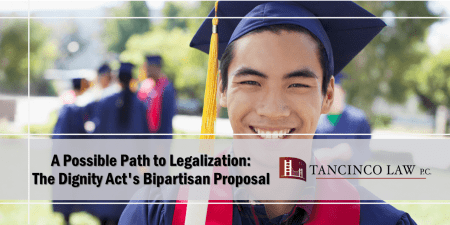In a political world marked by partisan divides, it is refreshing to hear news of a groundbreaking bipartisan proposal that holds the promise of transforming the lives of millions of undocumented immigrants in the United States. This bill called the “Dignidad (Dignity) Act of 2023”, if passed into law, is a remarkable legislative endeavor aimed at providing a clear path to lawful status for undocumented individuals, securing the nation’s borders, safeguarding American businesses, and bolstering the nation’s economy. Introduced in the U.S. House of Representatives by Representatives Maria Salazar (R-FL-25) and Veronica Escobar (D-TX-16), this legislation brings with it a ray of hope for those who have been waiting in the shadows, yearning for their immigrant status to be legalized.
A Brighter Tomorrow: The Dignity Act’s Pathway to Legal Status
The Dignity Act is a proposal that offers two distinct options for acquiring lawful status: the Dignity Status and the Redemption Program.
To qualify for either status, applicants must complete the “Dignity Program.” This program, at its core, provides a seven-year deferred action on removal, along with employment and travel authorization. To be eligible, individuals must prove five years of continuous physical presence in the United States before the enactment of the legislation, demonstrate good moral character, pay a fine of at least $1,000, and pass a criminal background check.
Upon successful completion of the Dignity Program, applicants must choose between Dignity Status and the Redemption Program. Dignity Status grants a five-year lawful status in the United States with the possibility of renewal, offering a chance for a stable life. Meanwhile, the Redemption Program, an optional path, provides a five-year conditional status with employment and travel authorization. After fulfilling the program’s requirements, participants can apply for lawful permanent residency, securing their place in the United States.
Hope for Dreamers: A New Beginning
The Dignity Act also extends its embrace to Dreamers, individuals who were brought to the United States as children. Dreamers and DACA recipients may obtain conditional permanent resident status by meeting specific criteria, including continuous presence for three years, education, and possible military service. This act not only recognizes the contributions of these individuals but also honors their dreams and aspirations by offering a chance at legal status.
A Transformative Immigration Landscape
In addition to providing pathways to lawful status for undocumented individuals, the Dignity Act proposes significant changes to various facets of immigration law. It strives to streamline the adjudication of asylum claims, establishes Humanitarian Campuses near the border, and creates processing centers in Latin America. Furthermore, the act offers a path to citizenship for eligible TPS recipients and reduces visa backlogs, ensuring a more streamlined immigration process.
The Dignity Act also brings about pivotal changes to employment visa categories, such as the H-2A Agricultural Guest Worker Program, removing seasonal requirements and visa caps, while also ensuring pathways to lawful status for undocumented agricultural workers. The act makes E-Verify mandatory nationwide, with phased implementation to ensure employer compliance.
In conclusion, the Dignity Act of 2023 is one of those bills that, if passed into law, will benefit those who have been waiting for their immigrant status to be legalized. It is a comprehensive, bipartisan effort that not only offers a pathway to legal status but also paves the way for a more inclusive and just immigration system.
We look forward to getting more support for this bill as it represents positive changes that could bring progress to our nation, offering renewed hope to those who have long sought the dignity and security they deserve.
Tancinco Law, P.C. will continue to update you on any developments on these types of bills. If you have any questions, you may contact us through our website www.tancinco.com or by texting us at 415 397 0808.




